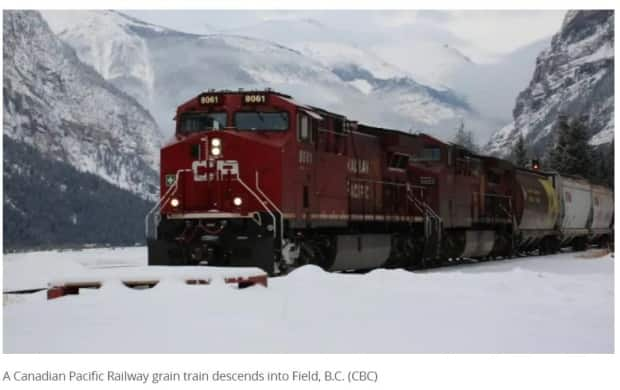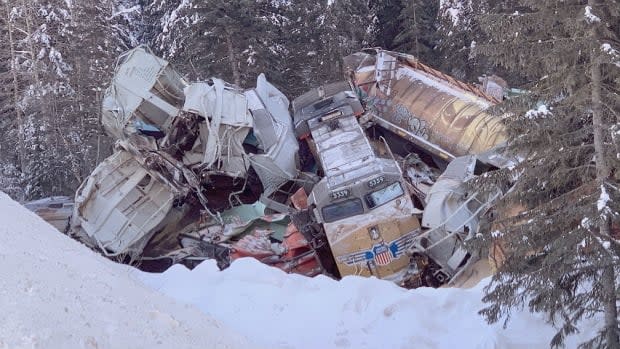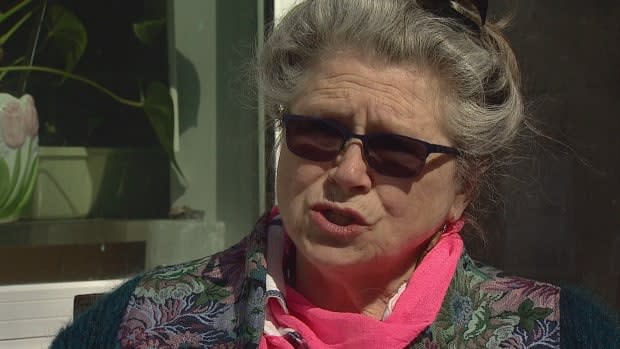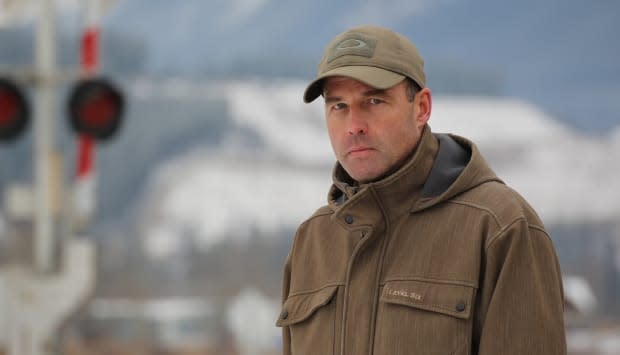Families of railroaders killed in runaway train derailment in 2019 sue CP Railway and Ottawa

As CP Train 301 rolled away from where it sat, parked on a mountain slope just west of the Alberta border — one of the most dangerous stretches of rail in North America — the doomed crew hopped aboard, believing they would be able to stop the runaway train and unaware that the brakes on the 112 freight cars had failed in the extremely cold weather conditions.
The crew also couldn't have imagined that their employer's own police force would investigate their deaths in the derailment near Field, B.C., resulting in allegations of a coverup.
These are some of the details contained in statements of claim filed by two of the victims' families who are suing Canadian Pacific Railway, its police service, CEO, board of directors, Transport Canada and a former investigator.
None of the allegations have been proven in court, and statements of defence have not yet been filed.
'It's not about money'
The three Calgary-based crew members — engineer Andrew Dockrell, 56, conductor Dylan Paradis, 33, and trainee Daniel Waldenberger-Bulmer, 26 — died on Feb. 4, 2019, after the train derailed near Field, B.C.
"It's not about money," said Pam Fraser, the mother of Dylan Paradis.
"I'm very blessed, I have everything I need at this stage of my life. I'm not in need of a thing except justice and accountability for my son and those other two men."

The lawsuits, filed by Regina lawyer Tavengwa Runyowa, allege on behalf of the Paradis and Dockrell families that for years, CP had been cutting corners to increase profits at the expense of its employees' safety.
As a way to "slash costs," CP had a history, according to the lawsuits, of using "bad ordered" cars that had malfunctioning brakes and other mechanical defects.
"Where these cars had any brakes at all, they were worn beyond their capacity for safe and effective application," allege the lawsuits, served last week on the defendants.
'CP disputes these baseless allegations'
The statements of claim also allege that CP has a long-standing pattern of "directing, interfering with, accessing, and controlling the CP Police Service conduct of criminal investigations."
In a written statement provided to CBC News, CP says the company mourns the loss of the three railroaders, who "will never be forgotten."
"CP disputes these baseless allegations and will vigorously defend against these claims in court," the company said in its statement.
Transport Canada also provided a written statement to CBC News, saying it's reviewing the statements of claim but won't comment on the legal actions while the case is before the courts.
"Transport Canada reiterates that the safety and security of Canada's transportation network, including our railway system, remains of the utmost importance to the department."

Braking system '0% effective'
Late on Feb. 3, 2019, Dockrell, Paradis and Waldenberger-Bulmer were called to replace a crew that had made an emergency stop, parking on the mountain near Field, about 80 kilometres west of Banff along the Trans-Canada Highway.
The train remained parked on the slope for three hours without handbrakes — considered the first line of defence against runaways. With blowing snow and strong winds that made the temperature feel like –40 C, the secondary air brakes were losing pressure.
The Transportation Safety Board of Canada (TSB) would eventually conclude that before the derailment, Train 301's braking system "had been 0% effective," according to the statements of claim filed on behalf of the Dockrell and Paradis families.
The braking problems weren't a one-off, the lawsuits allege. They were part of a "use-it-until-it falls-apart-approach to cost cutting," the claims read.
CP police never investigated company's actions
But CP's liability goes beyond the alleged culture of prioritizing cost-saving measures over safety, the lawsuits claim.
After the fatal derailment, CP deployed its own federally authorized police force, CP Police Service (CPPS), which is paid for and owned by the railway.
The purpose of the CPPS investigation — as confirmed in a January 2020 email sent by CPPS Chief Al Sauve to CBC News — was to examine the actions of the three dead crew members.
The investigation didn't consider a manager's call to continue to run the train through the night in the frigid cold, despite the previous crew's difficulties bringing it to a stop.
It also didn't look into the failure to apply handbrakes during that emergency stop or investigate the company's potential criminal negligence in the fatal crash.
CPPS officers have no training in rail disasters involving criminal wrongdoing or in forensic investigations.
Despite the thousands of deaths, derailments and serious injuries in CP operations over the years, according to the lawsuits, CPPS has never laid criminal charges against the corporation or its executive leaders for conduct relating to railway disasters.
'The train is out of control'
On the night of Feb. 3, 2019, Train 301's previous crew had struggled in the conditions to control the train as it began to descend the mountain.
Just one day before his death, Dockrell recorded that he'd experienced brake problems on the same steep mountain slope.
When it began rolling, the crew members hopped on in a bid to bring it under control.
But as the TSB investigation concluded — based on tests on 13 cars that remained undamaged — the brakes on the 112-car train were in such poor shape that Train 301 was doomed.
As the train accelerated, Dockrell shouted over the radio, "Emergency…. The train is out of control."
Runaway train reached speeds of 92 km/h
He began calling out their speeds.
On the stretch of rail where the train's speed limit was 32 km/h, Dockrell's final communication had the train travelling 92 km/h, according to the lawsuits.
The head end of the train derailed about a third of a mile from the Lower Spiral Tunnel, into the Kicking Horse River, in the early hours of Feb. 4, 2019, with 99 loaded grain cars derailing in three spots.
Just minutes after they'd hopped aboard, Dockrell and Paradis were dead, and Waldenberger-Bulmer had suffered injuries that would claim his life as maintenance crews arrived at the scene.
Pam Fraser, Paradis's mother, said she doesn't want other rail families going through the trauma of losing their loved ones in unnecessary tragedies.
"It's been unnecessary; on the other hand depending on your spiritual beliefs, maybe it is necessary," Fraser said. "It better be all it's going to take to get these changes done — it better be all it's going to take because it's already too much."

CEO attended investigation scene
The day after the crash, CP CEO, Keith Creel, attended the derailment as part of corporate management's oversight of the scene, the lawsuits claim.
Under his guidance, or at least with his knowledge, Creel had CP employees clean up so the company's railway traffic could resume moving along the line, according to the court documents.
Two months after the crash, the TSB issued warnings to Transport Canada calling on government overseers to ensure railway companies were complying with safety standards and had properly functioning braking systems.
Don Crawford, the TSB's lead investigator on the derailment, told CBC News in January 2020 that he believed an investigation by an outside policing service was warranted.
"There is enough to suspect there's negligence here, and it needs to be investigated by the proper authority," Crawford said at the time.
After speaking out, Crawford was demoted, according to the lawsuits.
Allegations of 'coverup'
Former CPPS officer Mark Tataryn, who is named as a defendant in the lawsuits, told CBC News in a 2019 interview that he believes there was a "coverup" orchestrated by CP.
Tataryn was assigned to investigate the derailment and told CBC News his superiors blocked him from looking into the maintenance history of the train, the orders given by managers the night of the disaster and whether safety policies were followed on the mountain just east of Field.
"CP Railway's corporate management oversaw the derailment scene, the gathering of evidence, including taking custody of the event recorders (black boxes) and the data available on the accident," the lawsuits allege.

Tataryn resigned from CPPS and now works as an RCMP officer in Golden, B.C.
At the time he made his comments alleging a coverup, CPPS Chief Al Sauve called Tataryn a "disgruntled employee" who'd resigned in the face of misconduct allegations — an accusation the former investigator said was designed to discredit him.
"I am happy to know this serious event is being investigated, and the truth of the facts in issue will come to light and the responsible parties held accountable," Tataryn said in a written statement issued on Saturday.
"Based on there currently being a criminal investigation, I am not able to comment further on this matter."
Aside from CPPS, two different government agencies looked into safety and workplace issues in the derailment. The TSB ruled out crew error as the cause, and federal labour officials concluded that CP "failed to identify and assess the hazards" on the mountain, a determination the company is appealing.
In December, nearly two years after the fatal derailment, the RCMP's major crimes unit in British Columbia opened a criminal investigation, looking into the crash and allegations of a coverup.
It took a formal complaint launched by Fraser to make that happen. She says her son would expect nothing less from her.
"He'd expect me fully to fight for him.... I took my children's health very seriously and now when Dylan was having his babies, Meadow and Molly, they made fun of me of how protective I was over my grandbabies. Maybe it was all in preparation of being able to stand up to this fight."
WATCH | Investigating fatal Canadian Pacific Railway crash:
In naming the federal government as a defendant, the lawsuits accuse Transport Canada of failing to ensure proper oversight of the railway.
"The minister of transport was well aware of these historical and worsening dangers, including CP Railway's poor record of conducting safety inspections and prioritizing efficiency and expedience over workplace and public safety," the lawsuits allege.

 Yahoo Movies
Yahoo Movies 